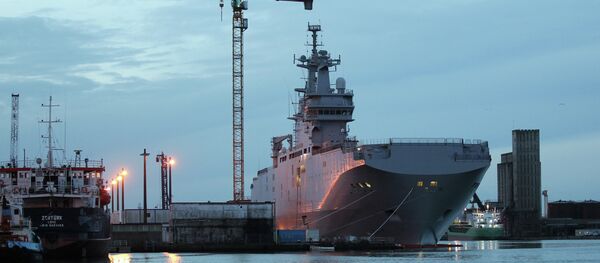France’s third largest union, the ‘Confédération Générale du Travail’
has expressed outrage at the possible collapse of the sale, and the government is under pressure to protect French jobs and prevent major financial losses.
French jobs at stake
When the €1.2 billion Mistral deal was signed in 2011 it created hundreds of French jobs, and was hailed by President Nicholas Sarkozy as evidence that the cold war was well and truly over.
France would supply Russia with two command ships: bases for airborne units, these superstructures are powerful military assets, able to transport landing troops, armoured vehicles, tanks and helicopters.
But on September 3rd this year, just over two months before the planned delivery date of the first ship, it was announced the deal would be delayed due to events in Ukraine. If the deal is not completed the cost to the French economy could be great. France would have to reimburse all the monies Russia has already paid, and may also have to pay a default penalty.
Yaraslau Kryvoi, an Associate Professor of Law at the University of West London, says such a penalty could be massive,
“This may well result in a legal dispute. In case France fails to fulfil the contract on time or refuses to give the ships to the Russian Federation, Russia is entitled to file an arbitration claim. The contract is reported to have a break fee clause which can amount to more than 1 billion, which France would be obliged to pay in addition to returning the payments made by the Russian side.”
France has no wish to back out of a deal worth this much.
When fighting broke out in Ukraine France refused to pull out of the Mistral agreement, despite pressure.
Pressure on Paris
The EU and the United States believe that the deal undermines the sanctions being levied on Russia for its alleged involvement in Ukraine, and do not think France should be providing military equipment to a country increasingly painted by the West as a threat to global security.
But President Hollande initially kept to the time-table of the contract, and in June Russian sailors arrived in France to begin training.
However, on the eve of the NATO summit in Wales this September, the President stalled the deal, saying that there must first be a ceasefire in Ukraine and signs of progress towards a political settlement before delivery could go ahead.
The partial ceasefire in Eastern Ukraine in mid-September, prompted France to begin sea-trials for the Mistrals, but the truce did not hold and once again the deal was hanging in the balance.
Inside France, opinion over Mistral is divided.
There have been protests against the country supplying the Mistrals to Russia, including gatherings on the quay side where the ships are berthed.
But equally, there are calls for the deal to be honoured.
The former Prime Minister François Fillon said he thinks the ships should be delivered, and the Workers Force union has raised concerns about what it would cost the country if France went back on the sale.
Reputation damages
This makes Hollande’s position difficult, according to Andrea Gilli, Research fellow at the Centre for Security Studies at Metropolitan University in Prague,
“This is a socialist president not doing well economically or in the polls being asked to disappoint his electoral base – most of the industrial workers are a traditional stronghold of the Socialist party. From what I’ve read, French unions are asking to honour the deal. Not the biggest trade union – I guess the biggest unions probably didn’t want to step too strongly into this difficult terrain, but I think in general they support the deal.”
One of the reasons France finds itself in this difficult position, is because there has been an overproduction of weapons in Europe in the last few decades, according to Mr Gilli,
“There are too many industrial plants able to produce weapons. The case of the Mistral is a product of this situation. The tension you have is between national interest and European interest. If European countries had consolidated their defence industry over the past two decades, probably the situation would be a bit different. Countries would not be so desperate to sell their weapons abroad.”
If France refuses to hand over the ships, he will need to find an alternative buyer and this won’t be easy.
NATO and the EU have been suggested as possible purchasers but there are problems here, according to Mr Gilli,
“The first idea was that the EU should buy the two Mistrals. The second proposal was NATO. Both are quite remote. Neither the EU nor NATO have a Navy. So manning the two warships would not be easy. Which sailors would go there from which country, under which command? The second problem is more political. Few countries in Europe want to pay the price for France’s export policy. Simply put, Italy, Spain, Germany, the Netherlands are all producers of warships.”
If France backs out of the deal, it will be a boon for those governments looking for a tougher stance against Russia. But apart from the job losses, and resulting debt, it would also damage the country’s reputation as an exporter and supplier.




